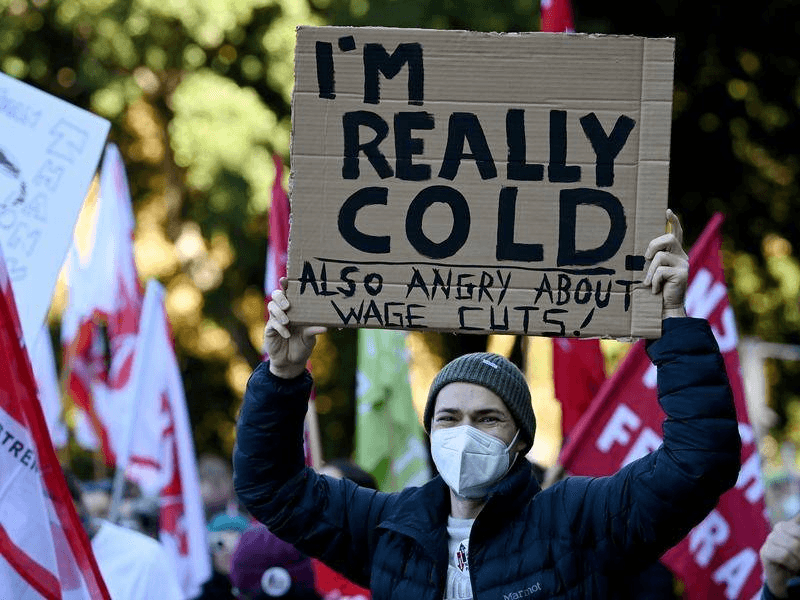The past few years have seen a resurgence in union activity throughout the English-speaking world. The US has witnessed unionisation drives in companies such as Starbucks and Amazon that have traditionally been extremely hostile to workplace organising. The UK has been rocked by organised mass strikes across industries unparalleled since Thatcher's crushing of the labour movement in the 1980s.
For those of us in Australia, this has given us hope that the surge in worker’s struggles we've seen abroad will soon become a reality here as well.
Since the Accords in the 1980s a great ‘class peace’ has reigned in Australia. Rather than confronting capital in the collective interests of the working class, the Australian Council of Trade Unions (ACTU) has spent the last four decades bending over backwards to the bosses.
This class 'peace' has been a disaster for the Australian labour movement in almost every way.
Our organisations have been smashed, membership has reached all-time lows, and wages and working conditions have consistently deteriorated while the bosses' profits have increased.
This brings us to the 2022 Jobs and Skills Summit, which is described by the Australian Treasury website as bringing “together Australians, including unions, employers, civil society and governments, to address our shared economic challenges”.
In effect, the Jobs Summit is the epitome of the ‘class peace’ to which the union bureaucracies have sold out our class to. This year saw a great emphasis placed on ‘tripartisanship’. The goal of this year's summit, according to all parties involved, was for the government, unions and business to discuss how they can work together to boost Australia's productivity in these difficult economic times.
But the interests of workers and bosses are diametrically opposed. Any collaboration between workers and bosses (or their representatives in the state) places workers’ interests in a subservient position to capital. The disastrous outcome of the Accords on the labour movement demonstrates what happens when unions collaborate with capital for the sake of productivity and 'peace'.
While this summit was far from an expression of working-class power, there were a number of topics discussed that will shape Australian society in the coming years, and thus affect the work of rank and file organisers.
What this means for unionists: Changes to workplace bargaining
First is the topic of multi-employer bargaining. In theory, multi-employer bargaining would be a great boon for the Australian labour movement as it would allow for more widespread direct action and increase ties of solidarity. In practice, such a change would be mitigated due to the restrictive and draconian anti-strike laws that continue to hamstring the labour movement.
Small businesses may raise the cry that multi-employer bargaining would mean “strikes and industrial action across unrelated industries.” However, this is sadly unlikely at the given juncture. The single largest change needed to benefit the interests of the labour movement is the smashing of forced arbitration and our anti-striking laws. But we can guarantee that such a reform will never come from parliament or from summit negotiations. A genuine victory like that will necessitate mass strike action in direct defiance of the laws that must be repealed.
A second discussion from the summit that is worth touching on, and one which has caused concern throughout the union movement is the proposed weakening (‘simplifying’ in politician speak) of the BOOT (Better Off Overall Test). The BOOT is meant to guarantee that an enterprise bargaining agreement (EBA) will not leave the relevant workers worse off than the industry award or minimum wage. While no concrete changes to the BOOT are yet to be proposed, it is likely that any ‘simplification’ will make it much harder for unions like RAFFWU to continue using it as the basis for legal challenges, which they have used to successfully overturn dodgy SDA EBAs.
This may allow for unions to negotiate agreements for their members which leave them worse off than they currently are. Something which is only going to become more likely as capital continues to call on workers to “sacrifice for the economy.”
Intersectional exploitation
The pressing concern of this summit was to secure a supply of workers for Australian capital, proposed through a variety of means.
People receiving an old-age pension will be able to earn more before their government payments are reduced. As the elderly struggle with high food and utility bills, many will return to work. This is not an opportunity for them to earn some extra disposable income as it is being sold; if the government wanted that, they would simply raise the pension rate; instead, it ensures that the poor will have no rest in their later years.
There was a lot of discussion about gender equality, including how to make parental leave more flexible, reduce discrimination and harassment and close the gender pay gap. In a room full of the Australian ruling class, this was all couched in language with its origins in feminist reading groups.
“Businesswoman” Sam Mostyn urged attendees to “not forget about the lived experiences of women” and “for us to exercise our privilege carefully.” She went on to lament the fact that women over 50 are the fastest growing demographic of homeless people. In continuing, she stated, “So hundreds of thousands of women around the country today, maybe millions, may be looking at us and asking us to actually do our job.” Mostyn is a board member of the property developer Mirvac. Her job is dependent on the commodification of land and housing, which is a major cause of the housing crisis. Her job is to generate revenue for shareholders who profit from our inability to pay our mortgages or rent. She profits from the misery of the elderly women who sleep in their cars.
Though policies like parental leave may appear progressive on the surface, we shouldn't be under the illusion that summit attendees care deeply about women. The goal of these summit proposals is to deepen our exploitation, to extract as much "productivity" as possible from us. It was telling that mining billionaire and chief architect of the cruel cashless welfare card Andrew Forrest called women "the greatest untapped resource in Australia's economy," echoing numerous comparisons of women's workforce participation to untapped ore deposits.

Other changes include the permanent migration cap increasing by 35,000, and for programs to allow temporary visa holders who have graduated from Australian universities to work in Australia for longer. Australia has a long history of using its restrictive, racist border regime to serve the needs of capitalists.
Depending on the needs of the time, it will admit certain nationalities on certain types of visas.
Following WWII, it began to relax the White Australia policy, allowing non-English speaking migrants to immigrate to fill labour gaps, primarily in manufacturing.
Australia now provides temporary 457 visas to highly exploited construction and farm labourers.
International student visas serve several purposes: universities extract large fees from them, they serve as an underpaid source of labour for industries such as hospitality, and the Australian government offers permanent residency to the highest performing, contributing to the so-called "brain drain" in their home countries.
Women and migrants serve a useful role for capitalists - they can be pulled into the workplace at times like now when profits are threatened by an insufficient amount of workers. Once the crisis in employment is alleviated, they are then discarded - returned abroad or to the kitchen, with a lot less fuss than sending the Australian-born men home would make thanks to racism and sexism.
Australian, white and male workers must understand that the solution is not to limit job opportunities for other groups in order to increase their bargaining power. Racism, in particular, is used in Australia to bind the white population to our country's ruling class. Nationalism leads us to believe that we have more in common with them than with workers abroad.
Racism is a weapon that only serves the ruling class; when adopted by working-class people, regardless of the reasoning, we only serve to undermine our own struggle. Nor should we be fooled by a room full of our oppressors using the language of anti-oppression politics. They will always be our enemy, never the migrant worker.
So what can we take away from the summit?
Australia's history of racist and exploitative migration laws and the Accord echo down through the ages, now with a veneer of inclusivity and progress.
With unemployment remaining low and supply chain issues plaguing the country, the Australian labour movement is in a position of strength if we choose to use it. The unfortunate reality however is that the ACTU's bureaucrats are not only incapable of exerting such pressure but also ideologically opposed to it.
For Australian workers, our choice going forward is to be crushed to protect capitalists’ interests or to fight for our own. As the rank and file of the labour movement, we need to see the union bureaucratic machinery of the ACTU as the capitalist tool that it is.
No more summits, no more forced arbitration and no more class peace.
